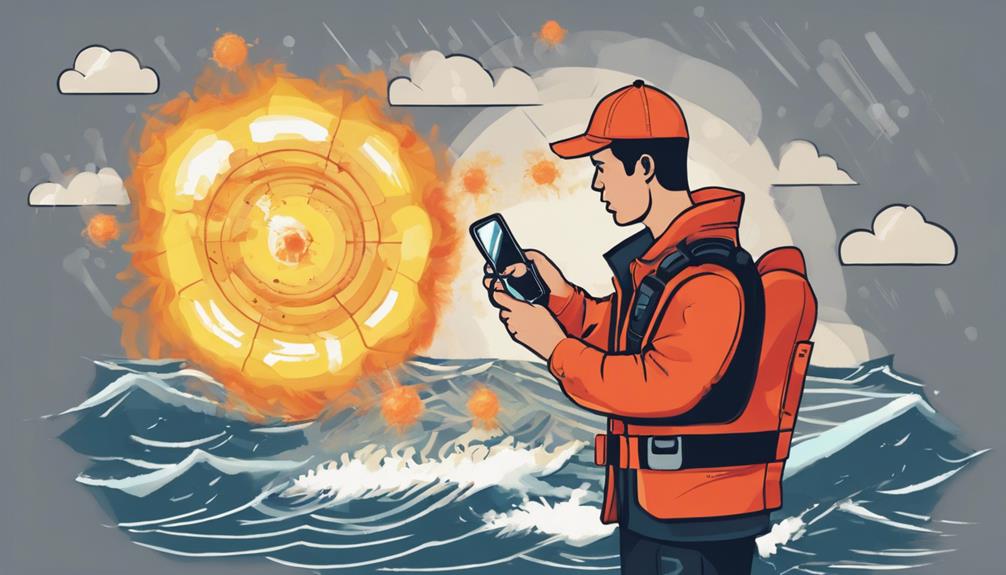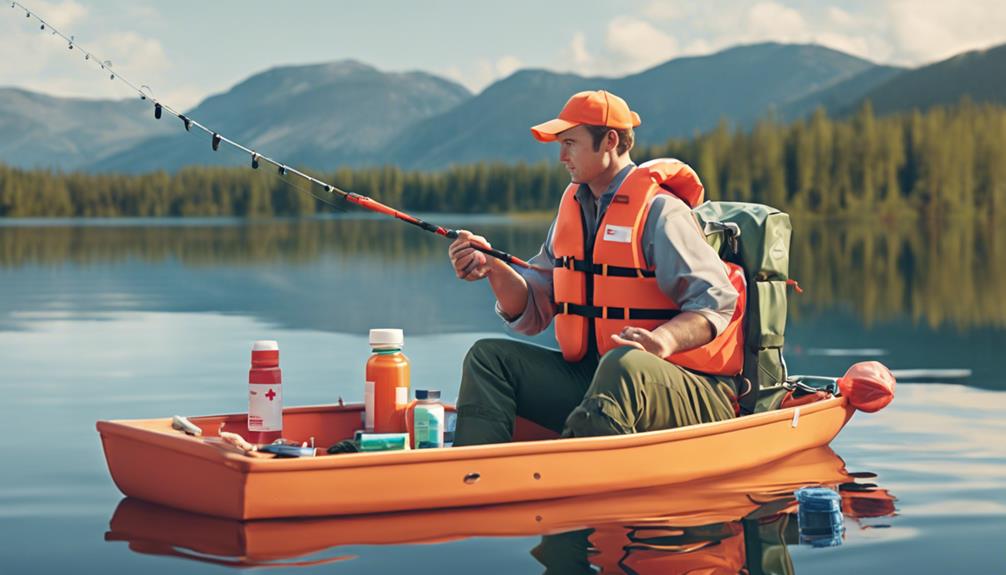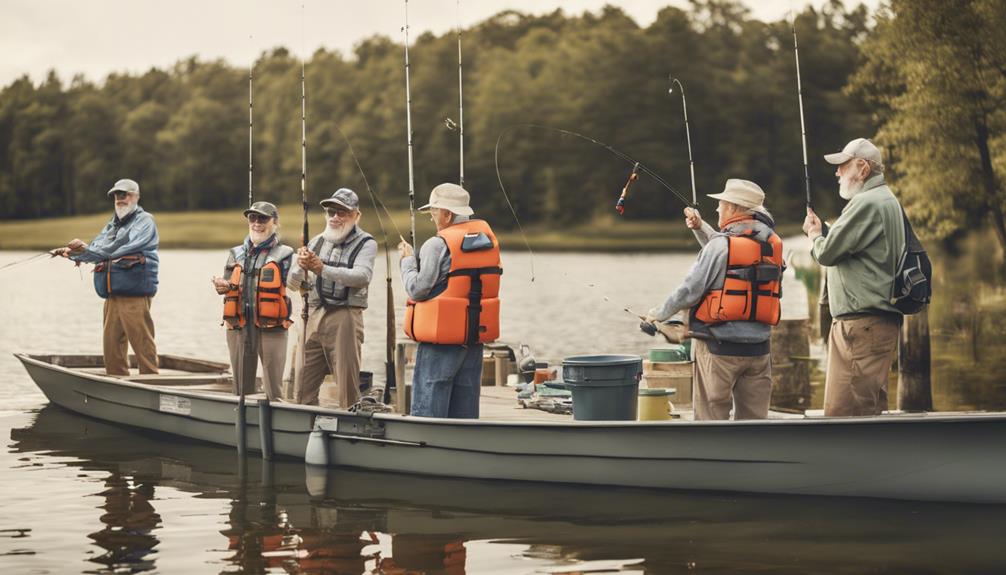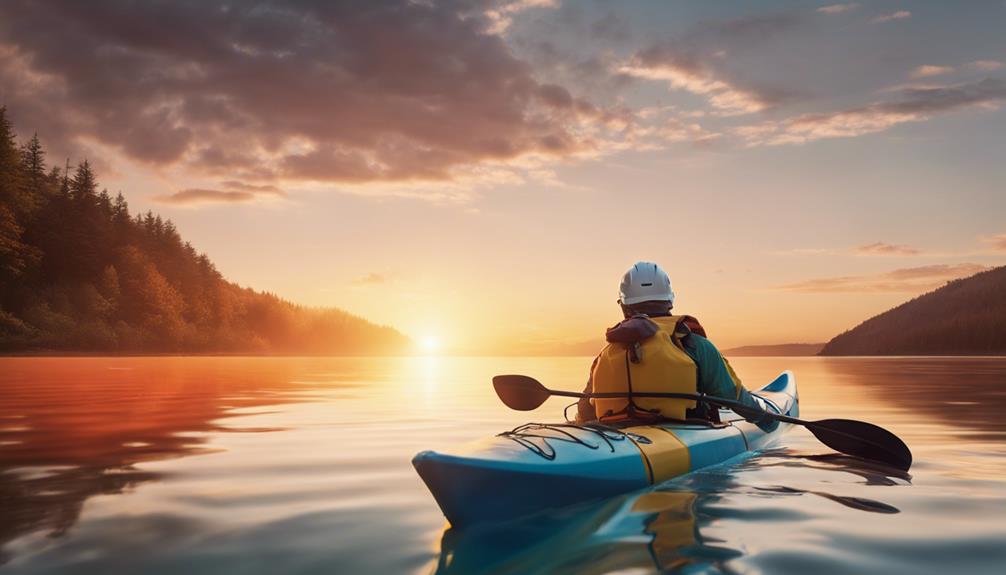Picture yourself as a sailor setting sail on the vast ocean, equipped with only your instincts and a compass. As you venture into the deep sea, the unpredictability of the waters becomes apparent, emphasizing the importance of being prepared.
However, just like a seasoned captain who meticulously ensures the ship is ready for any storm, there are crucial safety precautions you must consider before casting your line into the depths. From selecting the right gear to understanding emergency protocols, each step is vital in safeguarding your journey.
Proper Gear Selection
To ensure your safety during deep sea fishing, carefully select the appropriate gear for the expedition. Proper bait selection is crucial when heading out into the deep waters. Different fish species are attracted to different types of bait, so it's essential to research and choose the right bait for your target catch. Make sure to have a variety of bait options available to increase your chances of success.
Rod maintenance is another key aspect of preparing for a deep sea fishing trip. Inspect your fishing rods before setting out to sea to ensure they're in good working condition. Check for any signs of damage such as cracks or fraying lines. Clean the rods thoroughly to remove any salt build-up that could weaken the equipment over time. Proper maintenance won't only help improve your fishing experience but also prevent any accidents or failures while out on the water.
Weather Monitoring
Monitoring the weather conditions is essential for deep sea fishing safety. Before heading out, ensure your equipment is well-maintained, including checking your radio for weather forecast updates. Sea conditions can change rapidly, so it's crucial to stay informed. Keep an eye out for signs of changing weather patterns such as darkening clouds, sudden wind shifts, or a rapid drop in temperature.
Regularly monitoring sea conditions is vital. Pay attention to wave height, wind speed, and any storm warnings. Having a reliable radio onboard will help you stay informed about any weather changes. In case of extreme weather, it's important to have an emergency response plan in place. Make sure everyone onboard knows the procedures to follow in case of an emergency.
Being prepared for unexpected weather changes can make a significant difference in ensuring a safe deep-sea fishing experience. Stay vigilant, keep an eye on the horizon, and be ready to act quickly if conditions worsen. By staying informed and having a plan in place, you can enjoy your deep-sea fishing adventure while prioritizing safety above all else.
Safety Briefing
Before embarking on your deep sea fishing trip, ensure a comprehensive safety briefing is conducted for all onboard. This briefing is crucial to prepare everyone for potential emergencies and ensure a safe and enjoyable fishing experience. Here are some key points that should be covered during the safety briefing:
- Life Jacket: Make sure every person on board knows the location of the life jackets and how to properly wear them. Emphasize the importance of wearing a life jacket at all times, especially in rough seas or during emergency situations.
- Emergency Protocol: Outline the emergency procedures in case of accidents, rough weather conditions, or any other unexpected events. Ensure that everyone knows how to contact the coast guard or emergency services, as well as how to use any onboard safety equipment like fire extinguishers or distress signals.
- First Aid Kit: Familiarize all passengers with the location of the first aid kit and its contents. Provide basic instructions on how to administer first aid for common injuries that may occur during the trip.
- Man Overboard Procedure: Explain what actions need to be taken in the event of a person falling overboard. Detail how to alert the crew, maneuver the boat, and safely retrieve the individual from the water.
Emergency Preparedness
Ensure all passengers are well-informed and ready to respond effectively to any emergency situations that may arise during the deep sea fishing trip. Emergency preparedness is crucial for a safe and enjoyable experience out at sea. Conducting emergency drills before setting sail can significantly increase the chances of a successful response in case of an emergency.
During these drills, make sure all passengers know the location of safety equipment such as life jackets, fire extinguishers, and emergency flares. Assign specific roles to individuals for different scenarios to ensure a coordinated effort in the event of an emergency. Familiarize everyone with communication protocols, including how to use the marine radio and signal for help if needed.
Establish clear communication protocols to avoid confusion during emergencies. Designate a person in charge of communication and ensure that all passengers know how to reach this individual in case of an emergency. Practice using communication devices, such as radios or signaling devices, so that everyone is comfortable using them when necessary.
First Aid Kit Essentials
Make sure your first aid kit for deep sea fishing is stocked with essential supplies to handle common injuries and emergencies effectively. When out at sea, having the right first aid essentials can make a significant difference in providing immediate care.
Here are some crucial items to include in your deep sea fishing first aid kit:
- Sterile Dressings and Bandages: These are vital for covering and protecting wounds to prevent infections. Be sure to include a variety of sizes to accommodate different injuries.
- Antiseptic Wipes and Ointments: Use these to clean and disinfect wounds before dressing them. This helps prevent bacteria from causing further complications.
- Pain Relievers: Include over-the-counter pain medications such as ibuprofen or acetaminophen to manage pain from minor injuries or conditions like sea sickness.
- Tweezers and Scissors: These tools are handy for removing splinters, cutting bandages, or trimming tape. They can assist in performing minor first aid procedures effectively.
In addition to having the right supplies, familiarize yourself with basic first aid techniques and emergency response plans. Knowing how to administer CPR, treat burns, or handle cuts can be critical in emergencies.
Stay prepared and stay safe while enjoying your deep sea fishing adventures.
Navigation Knowledge
Equip yourself with essential navigation knowledge to confidently navigate the open waters during your deep sea fishing excursions. Understanding sea currents is crucial as they can significantly affect your vessel's movement. Be mindful of how these currents may impact your fishing spots and travel routes. It's essential to plan your journey considering the direction and strength of sea currents to ensure a safe and efficient trip.
Additionally, familiarize yourself with celestial navigation techniques. While modern GPS systems are reliable, having basic celestial navigation skills can be a valuable backup in case of technical failures. Learn how to use the sun, moon, stars, and planets to determine your position and course. This knowledge can be a lifesaver if you find yourself lost at sea without GPS signal.
Communication Equipment
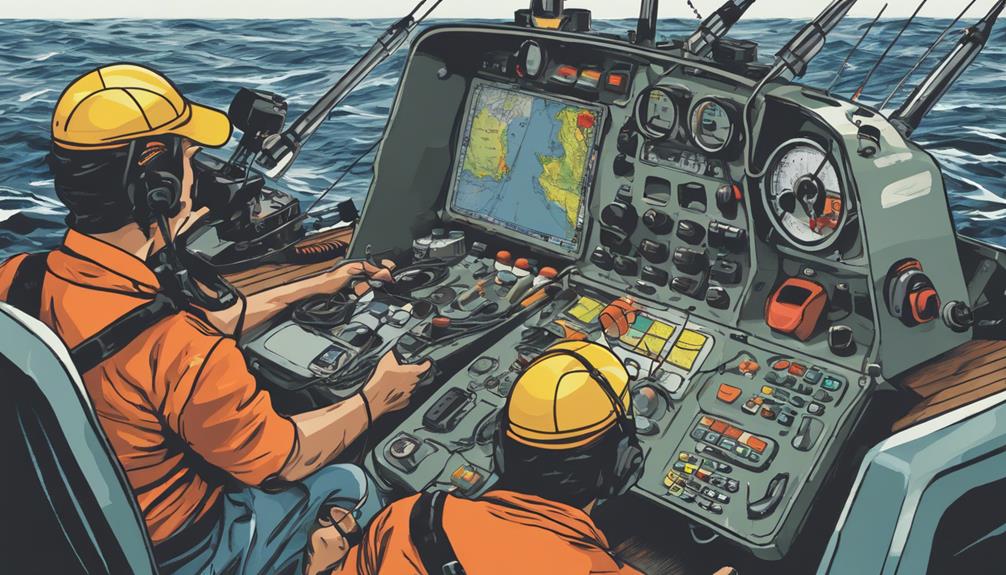
Having reliable communication equipment is essential for maintaining contact with your crew and emergency services while deep sea fishing. When out on the open sea, it's crucial to be prepared for any situation that may arise. Here are some key points to consider regarding communication equipment:
- Radio Communication: Invest in a high-quality marine VHF radio that's specifically designed for use on the water. This will allow you to communicate with nearby vessels, the coast guard, and other emergency services if needed.
- Emergency Signals: Familiarize yourself with the universal distress signals used at sea. These signals, such as flashing lights, flags, and sounds, can help you attract attention and indicate that you're in need of assistance.
- Backup Communication Devices: Always have backup communication devices on board, such as a satellite phone or an EPIRB (Emergency Position Indicating Radio Beacon). These devices can be lifesaving in case your primary communication equipment fails.
- Regular Maintenance: Ensure that your communication equipment is regularly maintained and tested before heading out on a deep-sea fishing trip. This will help prevent any malfunctions when you most need them.
Responsible Boat Operation
When operating your boat during deep sea fishing, it's crucial to adhere to responsible practices to ensure the safety of yourself, your crew, and others on the water. Proper boat maintenance is essential for safe operation. Before heading out, check the engine, fuel levels, navigation lights, and communication devices to avoid any malfunctions while at sea. Regular maintenance not only prevents breakdowns but also ensures that your boat is in optimal condition to handle the challenges of deep sea fishing.
Sea conditions play a significant role in responsible boat operation. Always check the weather forecast before setting out. Be aware of any potential storms or rough seas that could jeopardize your safety. Adjust your plans accordingly to avoid putting yourself and others in danger. While out at sea, continuously monitor the conditions and stay alert for any sudden changes. Your vigilance can make a difference in swiftly responding to adverse sea conditions and keeping everyone on board safe.
Frequently Asked Questions
How Can I Prevent Seasickness While Deep Sea Fishing?
To prevent seasickness while deep sea fishing, try focusing on the horizon to reduce motion sickness.
Stay hydrated by drinking water regularly and avoiding alcohol.
Snack on light, non-greasy foods to settle your stomach.
Consider taking motion sickness medication before heading out.
Remember to dress appropriately and choose a stable spot on the boat.
Being prepared and taking preventive measures can help you enjoy your fishing trip without feeling seasick.
What Steps Should I Take to Avoid Getting Tangled in Fishing Lines or Equipment?
To avoid getting tangled in fishing lines or equipment, make sure you wear proper safety gear and organize your tackle efficiently. Keep your gear organized and secure to prevent any mishaps.
Pay attention to the placement of your equipment and always be mindful of where lines are running to avoid entanglements. By staying organized and aware, you can enjoy your deep-sea fishing experience without any unnecessary complications.
Are There Any Specific Precautions I Should Take When Handling Sharp Fishing Hooks?
When handling sharp fishing hooks, remember hook safety is key. Take precautions by always being aware of where the hooks are, especially when casting or reeling in.
Use a hook removal tool to handle them carefully and avoid potential injuries. Keep your hands away from the pointed ends and handle them with caution to prevent accidental pricks or cuts.
Staying mindful of hook safety will help ensure a safe and enjoyable fishing experience.
How Can I Ensure I Stay Hydrated and Avoid Sunburn While Out on the Water?
To stay hydrated and avoid sunburn while out on the water, make sure to drink plenty of water throughout the day and wear sunscreen with a high SPF. Protect yourself by wearing a wide-brimmed hat, sunglasses, and lightweight clothing. Proper hydration and sun protection are key to staying safe and comfortable during your deep sea fishing adventure.
Remember to also keep your gear maintained and follow other important safety tips for a successful and enjoyable trip.
What Should I Do if I Encounter a Marine Animal While Deep Sea Fishing?
If you encounter a marine animal while deep sea fishing, stay calm and don't approach or provoke it. Keep a safe distance and slowly move away.
Always be prepared for unexpected situations by having safety equipment like life jackets and a first aid kit on board.
Following these safety precautions can help ensure a safe and enjoyable experience when facing marine wildlife encounters while out on the water.
Conclusion
Overall, deep sea fishing can be an exciting and rewarding experience, but it's important to prioritize safety at all times.
By following essential precautions such as proper gear selection, weather monitoring, safety briefing, emergency preparedness, first aid kit essentials, navigation knowledge, communication equipment, and responsible boat operation, you can ensure a successful and enjoyable fishing trip while keeping yourself and others safe on the open water.
Stay vigilant and prepared for any situation that may arise.
